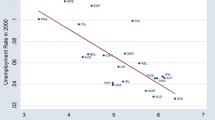Abstract
Little attention in the EMU literature has been paid to the interaction between centralbank monetary rules and systems of collective wage bargaining. Analytically andempirically, coordinated wage bargaining systems respond with real wage restraintto non-accommodating monetary policy. Since wage determination is dominated bycollective bargaining in all the EMU member states and wage coordination within themember states has grown since 1980, this is a topic of potential importance. In particular, the replacement of the Bundesbank, directly targeting German inflation, by an ECB targeting European inflation has removed a major institutional support of wage restraint in Germany. The consequences of this for EMU are worked out under two scenarios, that inflation expectations will be generated by ECB monetary policy and that they will reflect German inflation outcomes. Possible institutional developments are discussed including government-union bargains. The Bundesbank has also played a major role in maintaining fiscal rectitude by targeting excess fiscal deficits in Germany: again its replacement by the ECB – targeting (if at all) European rather than German fiscal policy – loosens fiscal constraints. For underlying structural reasons therefore, it is possible that Germany and other EMU countries will move to a period of fiscal activism with wage restraint and low inflation purchased through social contract negotiations.
Similar content being viewed by others
References
Carlin, W. and Soskice, D. (1990) Macroeconomics and the Wage Bargain. Oxford: Oxford University Press.
Eichengreen, B. (1994) International Monetary Arrangements for the 21st Century. Washington: Brookings.
Goodman, J. B. (1992) Monetary Sovereignty. The Politics of Central Banking in Western Europe. Ithaca: Cornell University Press.
Hall, P. A. (1994) ‘Central Bank Independence and Coordinated Wage Bargaining: Their Interaction in Germany and Europe', German Politics and Society (autumn), 1–23.
Hall, P. A. and Franzese, R. J. (1998), Mixed Signals: Central Bank Independence, Coordinated Wage-Bargaining, and European Monetary Union', International Organization 52(Summer), 505–535.
Iversen, T. (1998) Wage Bargaining, Central Bank Independence and the Real Effects of Money', International Organization 52(Summer), 469–504.
Iversen, T. (1999) Contested Economic Institutions. The Politics of Macroeconomics and Wage Bargaining in Advanced Democracies. Cambridge: Cambridge University Press.
Income Data Services (1996) European Management Guides: Industrial Relations and Collective Bargaining. London: IDS.
Layard, R., Nickell, S., and Jackman, R. (1991) Unemployment. Oxford: Oxford Unniversity Press.
OECD (1997) ‘Economic Performance and the Structure of Collective Bargaining', OECD Employment Outlook.
Scharpf, F. (1991) Crisis and Choice in European Social Democracy. Ithaca: Cornell University Press.
Soskice, D. (1990) ‘Wage Determination: The Changing Role of Institutions in Advanced Industrialized Countries', Oxford Review of Economic Policy 6, 36–61.
Soskice, D. and Iversen, T. (2000) ‘The Non Neutrality of Monetary Policy with Large Price orWage Setters', Quarterly Journal of Economics 115, 265–284.
Teulings, C. and Hartog, J. (1998) Corporatism or Competition. Cambridge: Cambridge University Press.
Thelen, K. (2000) ‘Why German Employers Cannot Bring Themselves to Dismantle the German Model', in T. Iversen, J. Pontusson and D. Soskice, eds, Unions, Employers and Central Banks: Macroeconomic Coordination and Institutional Change in Social Market Economies. Cambridge: Cambridge University Press, in press.
Wallerstein, M., Golden, M., and Lange, P. (1997) ‘Unions, Employers’ Associations, and Wage-Setting Institutions in Northern and Central Europe, 1950–1992', Industrial and Labor Relations Review 50 (April), 379–401.
Author information
Authors and Affiliations
Rights and permissions
About this article
Cite this article
Soskice, D., Iversen, T. Multiple Wage Bargaining Systems in the Single European Currency Area. Empirica 28, 435–456 (2001). https://doi.org/10.1023/A:1013968809278
Issue Date:
DOI: https://doi.org/10.1023/A:1013968809278




